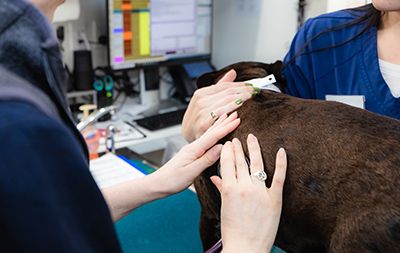Canine Laboratory Tests For Veterinary Care
At La Jolla Veterinary Hospital, we perform various laboratory work, including canine lab tests. We perform canine lab work when trying to figure out what is causing our canine patients to be sick, detect whether there is an illness, or determine the cause of a disease.
For example, it is not always apparent that a dog has intestinal parasites or heartworm disease. However, we will discover whether those worms exist in our canine patients when we perform lab work.
Understanding Canine Lab Tests
A canine lab test or blood test allows veterinarians to learn more about a dog’s health. Specific information can only come from collecting and analyzing a sample of blood. Some of this includes blood chemistries and complete blood count.
Blood chemistries analyze the chemical components in blood. A complete blood count identifies and measures platelets, red blood cells, and white blood cells in a specific amount of blood.
What Can Canine Blood Tests Identify?
A canine lab test can provide information about the following:
Digestive enzymes.
Glucose.
Endocrine levels.
Proteins.
Cholesterol.
Electrolytes.
Why Lab Tests Are Important for Your Dog’s Health
Chemicals in a dog’s body tend to correlate with specific organs. Thus, canine laboratory tests can help determine more than your dog’s blood count. If tests show albumin deficiency, for example, then your veterinarian will examine your dog’s liver. That is because the liver is the organ responsible for producing albumin.
Canine lab tests can also help veterinarians detect and identify complex issues with your dog’s body systems. For example, they can detect abnormal chemical or hormonal responses to internal and external stimuli. That will alert your veterinarian to a potential problem with your dog’s endocrine system.
Considering the above, you will appreciate the importance of canine lab tests as a veterinary care tool.
When Do We Recommend Canine Lab Work?
Some of the situations that can result in your veterinarian ordering blood/lab work for your dog include:
On the first veterinary visit for baseline information and to rule out congenital diseases.
During semi-annual wellness examinations.
If your dog displays some disease, illness, or injury.
Before starting new medications.
Before surgery.
During routine senior wellness exams.
Our in-house canine lab can process any dog culture or blood work. Some of the canine lab tests we perform include fecal exams, urinalysis, complete blood count, cytology, blood chemistries, and blood clotting times.
You should discuss lab tests with your vet if you have a canine companion. That will help you make informed decisions about whether your dog can benefit from blood work.
Our Canine Laboratory Testing Process
At La Jolla Veterinary Hospital, we always have veterinary staff on duty 24/7 to handle pet emergencies and an in-house laboratory. This helps us process canine lab work reliably and quickly, which is helpful in emergencies. It also increases the chances of determining the problem and implementing the appropriate medical intervention based on the lab results.
For more on canine laboratory tests, visit La Jolla Veterinary Hospital at our office in La Jolla, California. Call (858) 454-6155 today to schedule an appointment.








